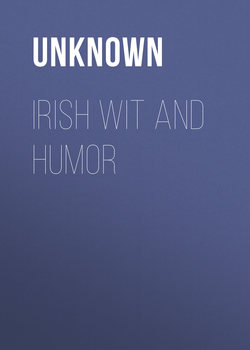Читать книгу Irish Wit and Humor - Unknown - Страница 45
На сайте Литреса книга снята с продажи.
DEAN SWIFT
THE DEAN'S CONTRIBUTORY DINNER
ОглавлениеDean Swift once invited to dinner several of the first noblemen and gentlemen in Dublin. A servant announced the dinner, and the Dean led the way to the dining-room. To each chair was a servant, a bottle of wine, a roll, and an inverted plate. On taking his seat, the Dean desired the guests to arrange themselves according to their own ideas of precedence, and fall to. The company were astonished to find the table without a dish or any provisions. The Lord Chancellor, who was present, said, "Mr. Dean, we do not see the joke." "Then I will show it you," answered the Dean, turning up his plate, under which was half-a-crown and a bill of fare from a neighboring tavern. "Here, sir," said he, to his servant, "bring me a plate of goose." The company caught the idea, and each man sent his plate and half-a-crown. Covers, with everything that the appetites of the moment dictated, soon appeared. The novelty, the peculiarity of the manner, and the unexpected circumstances, altogether excited the plaudits of the noble guests, who declared themselves particularly gratified by the Dean's entertainment. "Well," said the Dean, "gentlemen, if you have dined, I will order dessert." A large roll of paper, presenting the particulars of a splendid dinner, was produced, with an estimate of expense. The Dean requested the accountant-general to deduct the half-crowns from the amount, observing, "that as his noble guests were pleased to express their satisfaction with the dinner, he begged their advice and assistance in disposing of the fragments and crumbs," as he termed the balance mentioned by the accountant-general—which was two hundred and fifty pounds. The company said, that no person was capable of instructing the Dean in things of that nature. After the circulation of the finest wines, the most judicious remarks on charity and its abuse were introduced, and it was agreed that the proper objects of liberal relief were well-educated families, who from affluence, or the expectation of it, were reduced through misfortune to silent despair. The Dean then divided the sum by the number of his guests, and addressed them according to their respective private characters, with which no one was, perhaps, better acquainted. "You, my Lords," said the Dean to several young noblemen, "I wish to introduce to some new acquaintance, who will at least make their acknowledgment for your favors with sincerity. You, my reverend Lords," addressing the bishops present, "adhere so closely to the spirit of the Scriptures, that your left hands are literally ignorant of the beneficence of your right. You, my Lord of Kildare, and the two noble lords near you, I will not entrust with any part of this money, as you have been long in the usurious habits of lending your own on such occasions; but your assistance, my Lord of Kerry, I must entreat, as charity covereth a multitude of sins."
